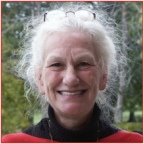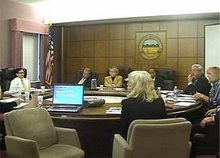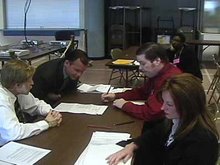As mentioned
in a previous post, ( #5-f) Secretary of State Brunner is in the midst of plans to test the Ohio's e-voting devices over this Summer, and aims to have a report out by September. As also stated there, California Secretary of State Bowen
is doing the same thing for that state, saying she is testing the electronic systems "from top to bottom."
The California plans were somewhat outlined in a
5/10 North County Times- San Diego article linked in that post.It states:
Secretary of State Debra Bowen said Thursday that computer experts hired by her office will take up Sequoia Voting Systems' equipment and software next week, along with those of two other vendors. Sequoia makes the Edge II terminals that Riverside County voters encounter at polls and the software that the county uses to manage elections and tabulate ballots. Bowen said in March that she would conduct a "top-to-bottom" review of the voting systems used in California's 58 counties, focusing on their security, reliability and compliance with federal and state election laws. The review is designed partly to allay concerns raised by activists who complain that voting software is open to manipulation by politically motivated computer experts, and that manufacturers haven't opened the software to public scrutiny that could help uncover such flaws.
Examinations of voting systems made by three other manufacturers are expected to begin in June and conclude by Aug. 3, giving counties at the end of the review process the legal minimum of six months before the Feb. 5 presidential primary to correct perceived problems with their systems' security or replace them with systems that Bowen approves.
Many counties across the United States have moved to touchscreens and other electronic voting systems in recent years after traditional punch-card ballots helped cause a weeks-long fiasco in the 2000 presidential election in Florida. But as electronic systems have become more common, so have suggestions that the machines can be rigged or the counting process hacked.
Election officials, (who in many cases have been wined, dined and "partnered" and "helped" to use those primitive systems that don't serve voters or election workers, but do serve the vendors and those beholden' to them,) lobbyists, and even politicians who lobbied for these e-systems and/or the few selected, highly insufficient vendors back in '03, as the Help America Vote Act was being pushed through Congress by Tom DeLay and Bob Ney (now both sentenced for other frauds,) under its euphemistic title; and who have followed, pushed or voted for these machines, for any number of reasons, some of which may even include just because they couldn't have known better in the short amount of time this legislation which spread these machines and vendors nationwide, had to be shoved through- even now, need to save face, or have become so boxed in - at times by the billions of taxpayer funds they've already spent on them, and/or "allegiances and partnerships" they've formed with vendors - keep trying to make us think e-voting and these vendors are the ONLY solutions.
Often this sector, rich with our taxpayer funds but little taxpayer influence, try to project their own political motivations on to anyone
finally and actually doing governmentally-led
valid tests on current electronic devices.
We thus hear that to authoritatively find and publish the expert facts about the systems is "political motivation," which doesn't even make any sense.
According to every independent expert academic, industrial and scientific test that has been done on these systems over the past 4 years, and despite these studies having been virtually blacked out of mainstream news - such future, clearly set out, scientifically and expertly done, independent fact finding, can only prove once again that Diebold, ES&S, Sequoia, etc need to be immediately removed from this nation's citizens elections.
Past independent expert findings that still few voters know about, (while they are asked if they "like" the colors on computer screens or pressing computer buttons,) have been so shocking and massive; have reached so far to the hidden cores of these systems which have never been independently studied (vendors claim we can't because of their proprietary ownership) or fixed; and which especially point so clearly, to how current e-voting devices allow those in power to undetectably and completely manipulate our vote results, (and track what and whom we are voting for) that any further tests on the same systems could prove no differently.
The California article shows the same dynamic that has been going on across the country, including Ohio for all these years. It states that:
Riverside County Supervisors Jeff Stone and John Tavaglione have suggested that they consider Bowen's review to be "politically motivated" and biased against the touch-screen computer systems that Riverside and 21 other counties use. Dunmore, Sequoia representatives and supervisors have often said that the Edge II terminals have been tested and certified by federal and California authorities.
The latter, unexplained "certification" argument is also the worn-out, unexplained catch-all paint, that to date, always neglects to mention what election-security activists have have been saying for years, and has just been proven with the decertification of the years-long "certifying" lab, Ciber - that that the federal and often previous state "testing labs", with few meaningful guidelines for security, accuracy and verifiability of our votes, have been both insufficient, or at least, beholden to the manufacturers, who pay for the tests.
And that is what has been providing the lofty "certification" supposed "seal of approval."
Since the planning of HAVA even before 2000, which spread current electronic voting systems made by politically friendly and profit-hungry vendors nationwide, the watchwords have not been sense, reason, facts nor verifiable proofs that these e-voting systems benefit the public, democratic elections or voters. Rather the "sense" of the arguments have only come from "following the money" and manipulation for growth of power.
The California article also states:
A leading Southwest County activist said he has a lot more faith in a group of experts that Bowen is putting together. Her office said Wednesday that it plans to hire 20 to 30 outside experts in election law and computer security to test the machines.
Nine whose names were released Wednesday include five university professors and Harri Hursti, a Finnish security entrepreneur who became something of a hero among voting activists after he discovered vulnerabilities in a touch-screen system made by a Sequoia competitor.
Hursti is one of three computer scientists hired so far to lead "red teams" who try to manipulate the machines' software to change the way it counts votes.
That group whom I understand is being gathered by Lowell Finley, formerly a lawyer known for standing for election integrity, and whom Bowen chose as her Assistant Secretary, sounds like it could be finally, a truly impressive and hopefully, independent expert group.
As stated in that previous post, since both Brunner and Bowen, both of whom ran and won primarily on election integrity platforms are planning the same kinds of tests, I certainly hope they gather and combine resources so every state can benefit from the finest testing that can be done. Hope for all and survival of our planet literally depend on real facts, not pure sales, financial, and political motivations dominating the cornerstone of democracy - our election process.
I therefore, look forward to learning the clear goals and processes of Ohio Secretary of State regarding our e-voting tests.
The Columbus Dispatch on Ohio Testing of E-Voting DevicesAs has been so typical of mainstream media, losing reader- and listener-ship , thus worried about maintaining revenue, and because of lessened staff, nationwide governmental fear, or no longer caring to make the effort, doing little research, but just following the status quo power shifters - on May 10 the Columbus Dispatch published an editorial about Brunner's testing.
"Just Making Sure" began by stating
" Retesting of Ohio's new voting devices likely will confirm accuracy;" along with
the now typical mainstream media, broad-brush smear over national and international experts who have conducted and those who've read the research:
Ohio's new voting machines will be tested again, and the results likely will disappoint conspiracy theorists.
California's group of experts include many whose clear and unmistakable reports and conclusions, that the Dispatch's "conspiracy theorists/election integrity advocates, have taken to governmental leaders for years, trying to dissuade them from originally spending hundreds of millions of our dollars on these low quality, security- holed devices that can so easily sway our elections.
This was my reply to the Dispatch:I too am "just making sure."(5/10/07.)
What scientific credentials – or information about lack of valid independent “experts” and/or goals for this summer’s Ohio testing of Ohio's voting devices - does your writer have, to know that these “likely will confirm accuracy”?
Every nationwide, expert independent study since 2004, not paid for or influenced by suddenly bloated, tax-paid, pockets of machine-makers and/or the politicians who love or fear them (or each other,) as happened during original "certification"; done by thorough experts including the GAO, and NIST; Johns Hopkins, Princeton, and Berkley Universities; Brennan Center, Hursti, ESI, RABA Technologies, individual states and more, all demonstrate with different approaches, but accumulating mounds of findings, that the electronic voting devices currently used in Ohio are unfit and dangerous for use in any democratic election. They together prove we have operationally and security-impossible, billion-dollar profit-makers for the few, which in many cases cause more far more work and expense than less, and have greatest benefit for insiders to easily, undetectably and completely change voters' “election results.”
The millions who’ve conducted and read the independent research, thus who already know that “liking” computer colors and buttons mean nothing, when the stakes are choosing the next president or council person in a process that has been widely recognized, even by our nation’s founders, as a likely target of power manipulation and abuse to be thoroughly avoided.
The 92% of Americans, who according to an 8/06 Zogby poll, want vote counting observable and open to public scrutiny, neither of which is possible inside our current "black boxes" with never-seen coding doing the "counting," also don’t fit your writer’s label of a "minority," nor of “conspiracy theorists.”
Maybe Ohioans should consider ourselves lucky to have such technical expertise right in your Dispatch offices. But intelligence and hope shows that we’d all be better off if you concentrated more on journalism - telling ALL the facts, than so blatantly and foolishly trying to misguide your readers.
Adele Eisner
It is vitally important that Ohio's e-voting device tests have clearly defined, thorough goals, and top-notch, highly-qualified independent computer, election-integrity, and design engineers experts to make an actually first and urgently needed, valid governmental testing effort in this state worthwhile - to democracy, to voters.









